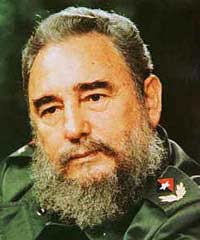Fidel is ok, doctors say
Talk radio stations devoted nearly all their airtime to the Castro story, and government leaders set up a hot line to keep rumors in check. But in an area where Castro has loomed large for more than a generation, many of Miami-Dade County 's 800,000 Cuban-Americans have long dreamed of the day his communist rule would end.

Most Cuban-Americans view Castro as a ruthless dictator who forced them, their parents, or grandparents from their home after he seized power in a revolution in 1959.
Reports that Castro had temporarily ceded power to his brother, Raúl, because of a serious intestinal ailment led a pot-banging, cigar-smoking, flag-waving crowd to take to the streets of Miami's Little Havana on Monday night.
The crowds were smaller yesterday but no less fervent, with about 75 people gathered at midday outside the Versailles Cuban restaurant, waving Cuban flags and honking horns. Vendors sold small US and Cuban flags to passing motorists for $7 each.
The festive atmosphere was tempered by the understanding among many Cuban-Americans that Raúl Castro harbors the same views as his brother and has been in firm control of the island's military. Jorge Alonso, 78, said he expected true change to take 20 years or more.
US and Florida officials have long had plans to avert an exodus from Cuba if the Havana government suddenly opened its borders. There is also concern that Cuban exiles might attempt to cross the Florida Straits in the opposite direction to return to their homeland or pick up family members, the AP reports.
Governor Jeb Bush said the plan is to prevent a mass movement of people that could create ``tremendous hardship and risk for people that can lose their lives."
Frank Calzon, executive director of the Center for a Free Cuba, said it will be difficult for Raúl Castro to maintain his grip on power, which could lead to a bloody struggle for control.
Subscribe to Pravda.Ru Telegram channel, Facebook, RSS!


